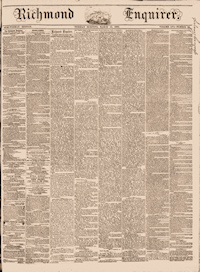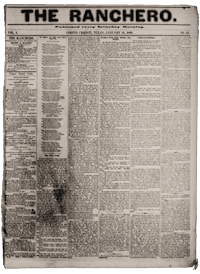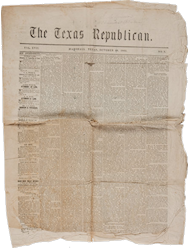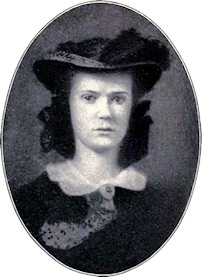March 27, 1863, The New York Herald
The only news from the Potomac Army today is that Governor Curtin, of Pennsylvania, visited the troops from his State and made quite a sensation among them.
The forces of Union cavalry under Major Stratton, which was sent from Suffolk to relieve the garrison of General Foster command, who were hemmed in at Winfield, N.C., as we reported yesterday, has just been heard from. They were in full pursuit of the enemy, who fled on their approach across the Chowan river with the aid of flatboats and rafts. General Foster subsequently destroyed these appliances of escape by the fire of his gunboats. The fight was of short duration, but while it lasted was kept up on both sides in a spirited manner. We had eight of the Eleventh Pennsylvania cavalry wounded in the encounter.
General Burnside has assumed command of the Department of Ohio, and has issued his order announcing the fact, which is declared most satisfactory. Indiana is made a separate military district, under General Carrington, who reports to General Burnside. The rebel advance force in the Kentucky invasion is variously estimated at from thirty-five hundred to ten thousand. Our troops are concentrating rapidly. Skirmishing was going on yesterday at Camp Dick Robinson, Ky., where a grand engagement was expected to come off soon.
We are in possession of news from Memphis, by way of Cincinnati, dated yesterday, to the effect that Admiral Farragut’s flagship Hartford discovered the Indianola at Hard Times Bend and recaptured her without resistance. The rebels had been at work on her, and she was nearly ready for service. The Queen of the West is up the Black river out of the reach of our vessels. The Jackson Appeal of the 18th instant says that General Banks had failed to make a land attack, and that Farragut went into the fight alone and passed the rebel batteries at Port Hudson at night under a terrific cannonade.
The Royal Gazette of Georgetown, British Guiana, of the 26th of February, contains the following: – It is rumored that his Excellency has issued instructions to the pilot department to the effect that, in the event of the Alabama calling here shortly on the plea of requiring supplies, the pilots are to inform Captain Semmes that as his vessel has recently received supplies at Jamaica, none can be obtained here within the time allowed by the home regulation.











